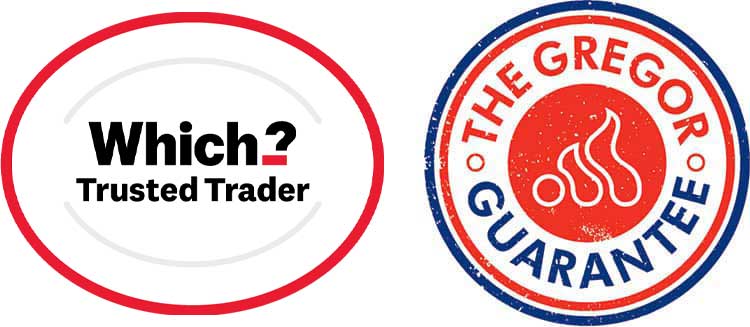A heat pump is very similar to a domestic fridge, and these have been around for over 40 years in different parts of the world. A fridge moves heat energy from inside the fridge to outside the fridge. If you ever feel the back of a fridge it is hot – it has transferred heat energy.
There are three main types: Ground source heat pumps (GSHP), Air Source Heat Pump (ASHP) and Water Source Heat Pump (WSHP). There are also Exhaust Air heat pumps.
A heat source from either ground, air or water boils a liquid refrigerant which has a very low boiling point. The refrigerant turns into a gas and then passed through a compressor. The compressor raises the pressure of the gas, and a physics law exists that means that when you raise the pressure you also raise the temperature. (Remember pumping up your bicycle tyre – your hand gets hot.) The heat is transferred from the refrigerant to the property’s heating system through a heat exchanger; and then the refrigerant is passed through a valve and turns back into a liquid.
A heat pump uses electrical energy to produce heat energy. Typically a heat pump uses around 1 unit of electrical energy to produce 3-4 units of heat energy. This means a heat pump is 300 to 400 percent efficient. This term is called Coefficient of Performance (CoP).
The heat pump efficiency depends on the outdoor air temperature and the temperature of the heating flow temperature – the greater the difference between the outdoor temperature and the flow temperature, the less efficient the heat pump becomes. Generally on the specification sheets for different heat pumps it states power and efficiency for:
- A7W35 – this means Air temperature 7ºC and Water temperature 35ºC, or:
- A2W35 – this means Air temperature 2ºC and Water temperature 35ºC.
The lower the outdoor air temperature, the more the heat pump efficiency and power output drops. This means that choosing a high-performing product that gives good outputs at low temperatures is very important, as also is designing your system to have the lowest possible flow temperature.
This is the Coefficient Of Performance (CoP) measured over a heating season. The heating system can work with both radiators and underfloor heating. If you are using radiators, then these should be oversized by about 2.5 times, as they will be designed to run at around 45ºC instead of the usual 70-80ºC when connected to a fossil fuel boiler. Underfloor heating complements heat pumps very well, as they typically run at 40-45ºC.
Until March 31st, 2022, a heat pump installed by an MCS (Micro Generation Certified System) company meant a home owner could claim payments for generating ‘renewable’ heat. The payments were also based on the SCoP of the system and the type of heat pump (either Air Source or Ground Source), and capped in kWh. The payments were based on deemed heat (space heating and hot water) from the property’s Energy Performance Certificate (EPC), with a maximum of 20,000 kWh of heat for Air Source Heat Pumps and 30,000 kWh of heat for Ground Source Heat Pumps.
For those who had signed up to the Domestic Renewable Heat Incentive scheme before the deadline, the payments will continue to be made quarterly over a 7-year period from the first one, and contribute considerably towards offsetting the initial cost of the system.
The Domestic Renewable Heat Incentive Scheme (DRHI) closed to new applicants on 31 March 2022. However, it has been replaced by the BUS boiler upgrade scheme (see below).
The Boiler Upgrade Scheme is a government-funded initiative to incentivise the installation of environmentally-friendly low-carbon alternatives to gas and oil boilers for central heating. All installations of ground-source heat pumps and air-source heat pumps installed on or after 1 April 2022 are eligible, although the applications process does not open until 23 May 2022.
BUS offers up to £6,000 as an incentive for ground-source heat pumps and £5,000 as an incentive for air-source heat pumps to homeowners who have first met the home insulation recommendations in an EPC report. Full details of eligibility requirements are available on this government page.
Generally a heat pump makes sense when displacing fossil fuels such as Oil, and LPG. When compared with gas financially, the running costs are very similar, for instance if you compare an efficient gas boiler with a modern Air Source heat pump.
A heat pump runs on electricity, and the ‘Carbon intensity’ of the electricity we buy has decreased over recent years. The electricity is made from a combination of fuel sources: nuclear, coal, gas, and renewable energy (wind and solar). However, the recently introduced subsidies for renewable electricity means that electricity now has a lower carbon content than gas.
The installation of a heat pump will raise the EPC of your property considerably; and this could increase the value of your property. A government report linked raising EPC with house value.
Since April 1st 2018, landlords wanting to rent to tenants have been required to have a property with an EPC of at least band E. From April 1st 2020, this will also affect existing letting contracts.
Contact Gregor about Heat Pumps
Are you interested in getting a heat pump installed in your home or premises? Please call us on 0117 935 2400 and ask to speak to our Renewables team. We look forward to discussing your heat pump needs with you and to booking you in for a survey if you would like one!


